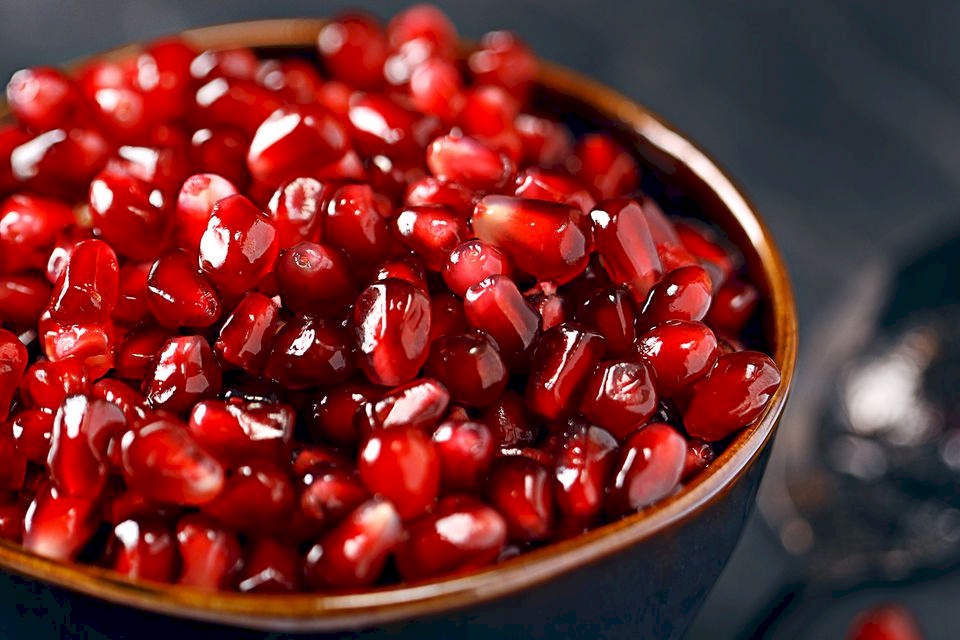
Pomegranate and Blueberries... Which has Higher Antioxidants and Provides Stronger Heart Protection?
SadaNews - If you are looking for heart-healthy fruits rich in antioxidants, pomegranate and blueberries top the list of "superfruits"; these fruits contain powerful plant compounds that fight free radicals and support vascular health, making them an ideal choice for those looking to lower blood pressure, improve cholesterol levels, and maintain heart health.
Scientific studies indicate that pomegranate juice may help reduce high blood pressure and improve blood flow, while blueberries contribute to enhanced endothelial function and lower diastolic blood pressure, especially in smokers.
Both fruits are also rich in powerful antioxidants such as punicalagin in pomegranate and anthocyanins in blueberries, which work to reduce inflammation and support overall heart health.
A report published by the "Verywell Health" site reviews the health benefits of pomegranate and blueberries, comparing their antioxidant content and the best ways to incorporate them into your daily diet.
What makes these fruits "super"?
Both fruits are rich in polyphenols, a group of natural plant compounds that protect the body from damage caused by free radicals.
Free radicals are unstable molecules that can damage cells, but they can be neutralized by antioxidants.
Pomegranate also provides compounds like ellagitannins and punicalagin, which give it its tangy flavor and strong antioxidant effects.
Blueberries, on the other hand, get their color from anthocyanins, another group of antioxidants known for protecting blood vessels and supporting heart health.
These compounds help reduce inflammation, decrease oxidative stress (which is the imbalance between free radicals and antioxidants), and may support healthy blood pressure and cholesterol levels.
Heart health benefits... what do studies say?
Pomegranate and blood pressure
Reviews of studies have shown that pomegranate juice can help lower blood pressure and improve blood flow. For example, one review found that pomegranate polyphenols reduce oxidative stress and improve the relaxation and dilation of blood vessels, helping to maintain normal blood pressure.
Another review indicates that pomegranate supplements may help improve cholesterol levels. Studies have shown that pomegranate may slightly lower harmful LDL cholesterol, raise beneficial HDL cholesterol, and reduce triglycerides, another type of fat in the blood.
These changes support heart health, especially for individuals with high cholesterol. However, the improvements are modest, and results may vary depending on the amount of pomegranate consumed, duration of use, and whether it is in juice or extract form.
Blueberries and vascular health
Researchers have also studied how blueberries can improve heart health. A comprehensive study found that individuals who regularly consumed blueberries or anthocyanin-rich berries had lower blood pressure and better vascular function.
Research has shown that blueberry interventions helped the endothelial function work better and reduced diastolic blood pressure in certain groups, such as smokers. While this suggests that blueberries may help maintain vascular health, the effects were not significant, and further studies are needed to determine the quantity and duration of blueberry intake required to achieve full benefits.
Which is richer in antioxidants?
Both fruits are rich in antioxidants, but each has a slightly different role:
Pomegranate is particularly rich in tannins and larger polyphenols like punicalagin, which give it higher antioxidant capacity in laboratory tests.
Blueberries provide anthocyanins and quick-acting polyphenols that can be easily utilized by the body.
So, while pomegranate may have more antioxidants in test tubes, blueberries offer more bioavailable antioxidants when consumed daily.
Juice vs. whole fruit... is there a difference?
Yes, there is a difference; most studies on pomegranate use juice or concentrated extracts. This means that people consume higher doses of antioxidants compared to just eating the seeds. However, juice can be high in sugar and added calories, which may not be suitable for those monitoring blood sugar or weight.
Blueberries are easy to consume whole. They are naturally low in sugar and calories and contain fiber. Many studies have shown that consuming the equivalent of one and a half to two cups of blueberries daily improves heart health.
Which should you choose?
If your goal is to support heart and vascular health daily, blueberries have stronger research support and are easier to consume regularly.
If you want to target oxidative stress or improve cholesterol, pomegranate juice or extract may provide an extra boost of antioxidants, but it may contain added sugar.
For most people, the best option is to enjoy both. Each offers different types of antioxidants that work in slightly different ways. Consume a mix of colorful fruits, such as blueberries, pomegranates, strawberries, and oranges, to give your body the broadest range of nutrients and benefits.
You can add blueberries to yogurt, sprinkle pomegranate seeds on salads, or blend either into smoothies. Variety in colorful fruits on your plate means more nutrients, more antioxidants, and a stronger heart.

Scientists Attempt to "Intercept Cancer" Before Its Formation.. Know the Details

American Fact-Checking Platform Exposes Trump's Exaggerations in State of the Union Addres...

How Mourinho Deceived Everyone and Watched the Match Between Real Madrid and Benfica from...

Fat Loss Improves Blood Pressure and Supports Immunity

Galaxy S26 Armed with a Smart Feature to Combat the Most Dangerous Threats to Smartphones

Discovery of Microplastic Particles in 90% of Prostate Cancer Cases

Artificial Intelligence Diagnoses Children's Brain Tumors with 92% Accuracy Without Surger...

